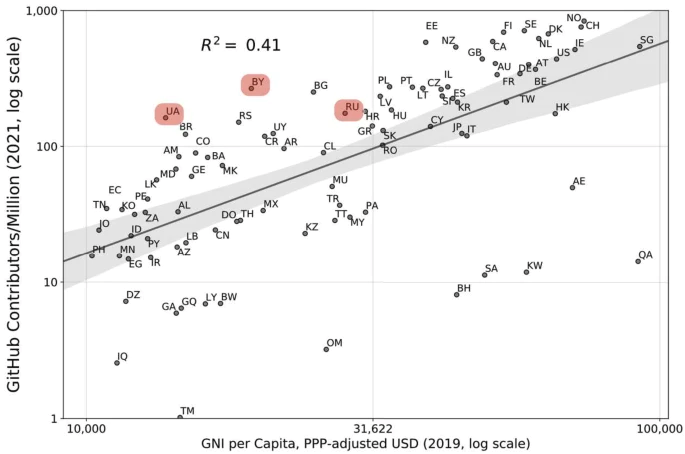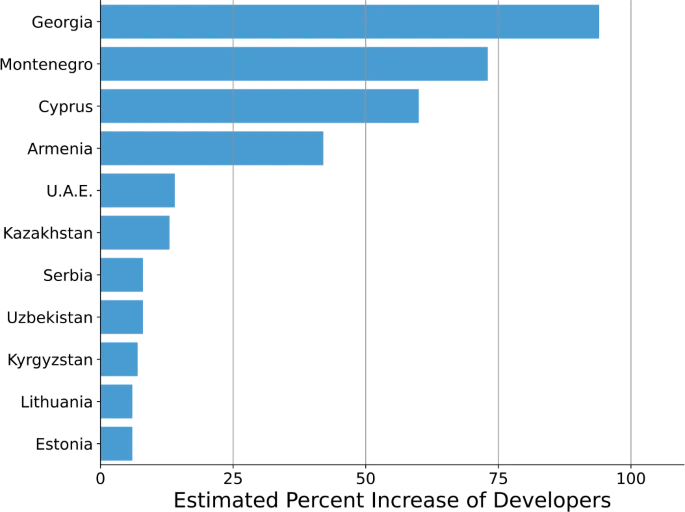
Major crises often lead to significant emigration, especially by highly skilled individuals.
Both when the Nazis rose to power in Germany and when the Soviet Union collapsed, the resulting emigrations of scientists, inventors, and artists permanently diminished the cultural and intellectual weight of both countries.
Emigres also changed the social and economic trajectories of their destinations. While in retrospect such effects seem obvious, it is difficult to measure the phenomenon of brain drain when it is happening, especially during a crisis like a war.
The Russian invasion of Ukraine in February 2022 is a good example of such a crisis. Besides the millions of Ukrainians who have had to flee their homes, a significant number of people are thought to have left Russia, especially those with in-demand skills.
Yet existing empirical evidence of this migration is unreliable, based on anecdotes, surveys by industry groups, or the Russian government itself. We also know little about who leaves, and where they go.
The Study
The aim of my study is to provide a better estimate of Russian brain drain since the start of the invasion. I study software developers using data from GitHub, the largest online community of open source software developers.
In previous work, I conducted a census of developers, comparing the concentration of developers in countries worldwide in early 2021.
Shortly after the invasion, I had the idea to revisit the GitHub profiles of those developers I had geolocated to Russia, Ukraine, and Belarus, and to see how many of them had changed their locations.
All three of these countries are strong in software and were significantly over-represented on GitHub in 2021 (see Fig. 1).

I revisited developers’ pages in June 2022 and again in November 2022 following Russia’s partial mobilization order. 11% of developers previously based in Russia listed a new country by November 2022 – that is a good lower bound estimate on emigration of developers.
Moreover, 13% of developers based in Russia removed any location information from their profiles, and another 3.5% had deleted their profiles. These are also potential emigrants, suggesting an upper bound estimate of around one in four developers leaving Russia by November.
These numbers are roughly four times higher than the turnover of developers in a comparison set of Eastern European countries not directly involved in the conflict.
I also highlight differences between the population of leavers and “remainers”, as I call them in the article.
Leavers tend to be more active developers, making up 11% of the pre-invasion developer population but making 14% of all contributions from Russia.
They are more central and better connected in the network of collaborations on GitHub, suggesting they played a key structural role in this highly collaborative industry.
We also know where leavers are going. I estimate that arrivals from Belarus and Russia represent a 42% increase in the pre-war population of developers in Armenia, 60% in Cyprus, and a staggering 94% in Georgia (see Fig. 2).
This influx has the potential to drive innovation and shape the future trajectory of these economies.

Why is this important?
One must acknowledge that relative to the large-scale loss of life and destruction of entire cities caused by Russia’s invasion, the emigration of Russian software experts is not the most important thing happening in the region right now.
That said, the emigration may have a significant impact on Russia’s economy even in the short-run, which may materially affect its ability to continue fighting. The long-term effects of brain drain are significant: weakened productivity, increased costs, and anemic innovation.
While there are sometimes benefits to brain drain, for example when emigres send remittances, invest back home or facilitate trade between their current and prior homes, these are less likely to be realized in this context, for instance, because of economic sanctions against Russia.
And now?
The extent to which this phenomenon will continue depends first and foremost on the future course of the war. Data from online sources like GitHub can provide updates on the rate of brain drain in this case and others.
Comments